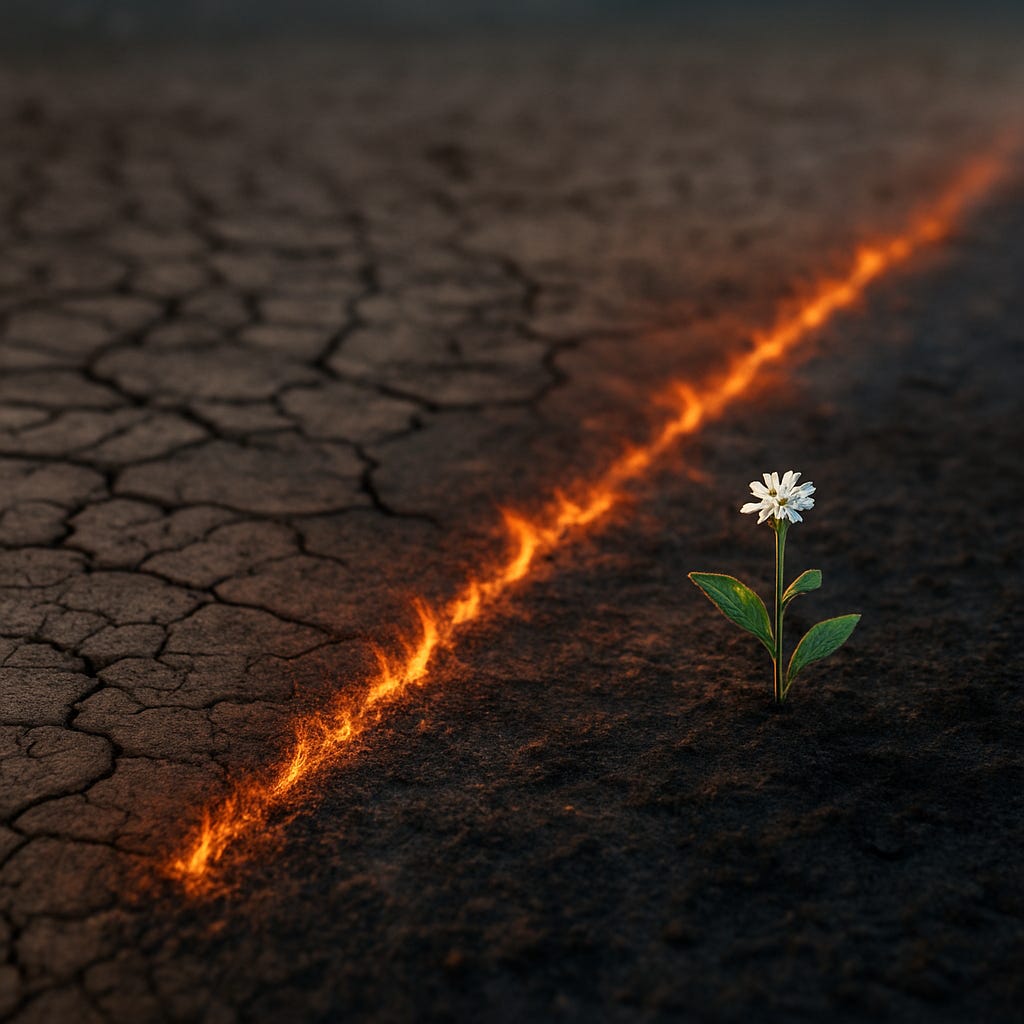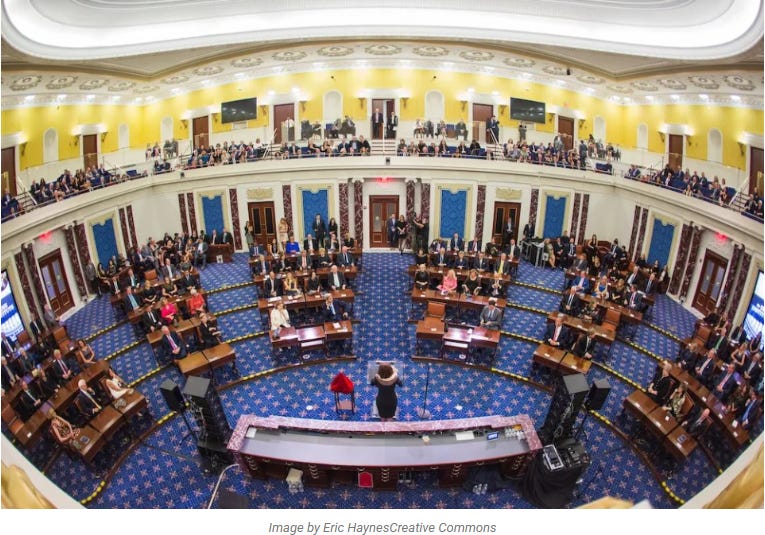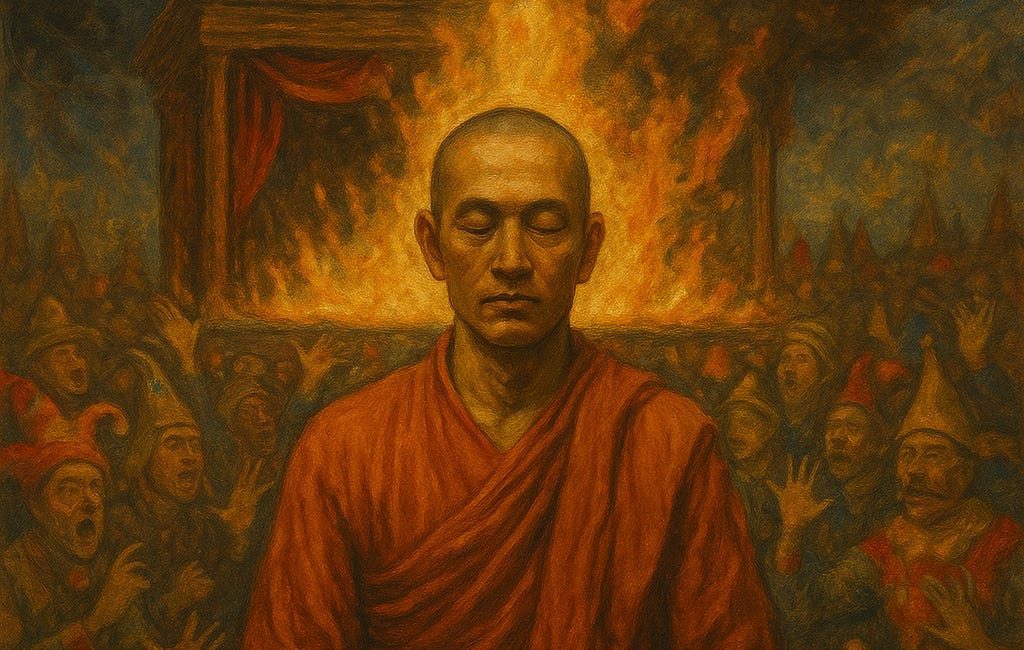This Far, No Further
The Line Between Decency and Desecration
(Read by Author)
The Stories We Tell Ourselves
We’ve all told ourselves stories. Stories that soothe the conscience and shield the ego. Stories that recast cowardice as caution, cruelty as strength, and silence as wisdom. The most dangerous story we tell is the one that says, “I’m a good person.”
Because once we believe that, we’ll justify almost anything to protect it.
We’ll overlook the harm. We’ll explain away the injustice. We’ll say, “That’s not who I really am,” even as our choices tell a different tale. And when someone draws a line, when someone says, “This, here, is wrong”—we don’t repent. We retaliate.
Because the myth of our own goodness is harder to surrender than any political affiliation.
But the truth doesn’t flinch just because our story does. And at some point, we have to ask: if goodness doesn’t shape our actions, what good is it?
When the Mask Drops
This moment we’re living in, it’s not business as usual. It’s not another partisan squabble or cultural disagreement. It’s a rupture, a moral unmasking. And like all moral reckonings, it begins with clarity.
The man who leads this country is not an enigma. He is not misunderstood. He’s not “just saying what others are afraid to say.” He says what no decent person should ever say. And he does what no ethical leader should ever do. He lies without shame. He mocks the sick. He cages the vulnerable. He praises the cruel. He breaks laws as casually as others break bread. He speaks in slurs and governs by spite.
And still, he’s defended.
That’s where the damage deepens. Not just in the man, but in the millions who call him good. In the neighbors who fly his banners. In the pastors who bless his reign. In the citizens who cheer as if truth were a football game and cruelty the cost of winning.
This isn’t about a man anymore. It’s about what we’ve become to justify him.
The Collapse of Shared Humanity
There was a time, not so long ago—when we believed we shared the same moral baseline. We disagreed on policy, argued over direction, debated the means. But we thought we shared some ends: dignity, decency, the rule of law, compassion for the vulnerable.
That illusion is gone.
What’s been exposed is the terrible truth: there are now two moral frameworks in America. One that believes in justice, truth, empathy, and restraint. And one that believes in domination, deceit, vengeance, and spectacle. One rooted in the idea that human beings are worthy of care. And one that sees human worth as negotiable, disposable, or transactional.
This is not about taxes or regulations. It’s not about party platforms or voting records. It’s about how we treat one another. It’s about whether power exists to serve or to crush. And every day we avoid naming that divide, we deepen it.
Let’s not pretend the gap will close on its own.
Because it won’t.
The Line That Cuts
We didn’t want this line. Most of us avoided it as long as we could. We tried nuance, tried empathy, tried patience. We hoped people would wake up. We waited for apologies that never came. But the years dragged on. The harm grew sharper. And the excuses grew louder.
Now here we are.
There is a line. Not between conservatives and liberals, but between those who still recoil at cruelty and those who celebrate it. Between those who name injustice and those who rationalize it. Between those who feel a stranger’s pain and those who treat it as entertainment.
This line isn’t political. It’s moral.
And yes, it divides families. Yes, it ends friendships. Yes, it makes things harder.
But it’s a line that must be drawn.
Because without it, everything erodes. Law becomes theater. Faith becomes branding. History becomes whatever the loudest voice says it is. Without the line, there’s no clarity. Without the line, there’s no resistance.
And if goodness means anything at all, it must mean saying: this far, no further.
What Goodness Requires Now
Goodness is no longer passive. It’s not theoretical. It’s not something we get credit for just by claiming it. It requires presence. It requires voice. It requires risk.
And yes, it requires choosing sides.
Because neutrality, at this stage, is a luxury only cruelty can afford.
If that sounds harsh, ask yourself: why doesn’t cruelty sound harsh anymore? Why do we apologize for calling things what they are, but not for the things themselves?
A good person doesn’t need power to act with conscience. A good person doesn’t need applause to tell the truth. And a good person does not stay silent when others suffer, not for comfort, not for civility, not for social peace.
If you still bless the machinery of cruelty with your vote, your voice, or your silence, you’re not on the fence. You’re part of the weight.
And history will not remember what you intended.
It will remember what you enabled.
The Benediction of the Boundary
So here it is.
The line.
Not one of hate, but of hope. Not of purity, but of principle.
It’s the line that keeps us human in a time of inhumanity. The line that says we will not normalize desecration. We will not pretend away the harm. We will not barter truth for peace, or justice for power, or love for loyalty to a name.
This far, no further.
And God help us if we flinch.
Further Reading:
Grace Under Fire: The Discipline of Dignity in a Time of Spectacle
I. Dignity in a Time of Spectacle






